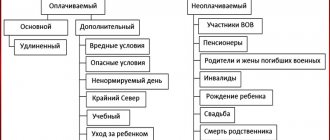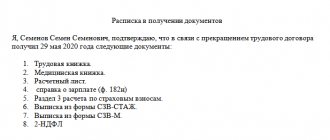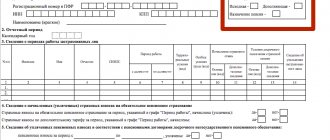An accounting certificate for the return of an unused advance by an employee to a current account. Still, the optimal way to return accountable funds, excluding any disagreements with controllers, is to the company’s cash desk. How is the amount of return of funds taken into account reflected in accounting? The company, having received accountable amounts from an employee, reflects in accounting the following entries:
- Dt 50 Kt 71 - return of cash to the cash desk;
- Dt 51 Kt 71 - return of accountable amounts to the ruble bank account of the enterprise;
- Dt 52 Kt 71 - return of the sub-report to the company’s foreign currency account;
- Dt 94 Kt 71 - reflection of the debt of the accountable in case of non-repayment of the amounts issued by him.
For information on what to do if an employee does not have enough accountable funds, read the article “What to do if an accountable person has spent his money?”
Return by the accountable person of the amount of unspent advance
The content of the article
Increasingly, companies are abandoning cash circulation. This allows you not to spend money on cash register equipment, eliminates the need to receive and deposit cash at the bank, and with large cash turnovers, it significantly reduces the costs of maintaining cashiers, collectors and security services on staff. The procedure for issuing funds on account Issuing money to an employee for travel, business and other expenses related to the company’s activities is a common practice.
How the accountable amount is returned to the cashier
Quite often the question arises: if it is possible to transfer money against an account to an employee’s bank card, is it possible to return the accountable amounts to the company’s current account? The employee must return the amounts received for travel or business expenses that were not spent by him within the following periods:
- on the day of expiration of the period for which the funds were issued;
- on the first day of returning to work after the end of a business trip, vacation, illness, etc., if the end of the period for which the money was issued on account falls within these periods.
Russian legislation does not contain any explanations on how an employee can return money received on account: by returning the accountable amounts to the cash desk or by wire transfer.
lic-r.ru
The money received is received at the institution's cash desk using a special document - a cash receipt order.
We also wrote about the rules for maintaining cash discipline. At the end of the day, the cashier calculates the balance of funds in the cash register: if it exceeds the maximum permissible limit for the cash balance, then the difference should be deposited into the current account of the government organization. An example of a return to the cash desk Let's say the supply manager of the State Budgetary Educational Institution of Children's and Youth Children's Institution "ALLUR" received a report of 10,000 rubles for the purchase of household chemicals.
The funds were transferred to the employee’s bank card.
The caretaker spent 9,500 rubles.
The remaining 500 rubles were returned to the institution's cash desk.
The cashier deposited the balance into the bank account at the end of the working day.
In this case, the manager is obliged to approve in the accounting policy or in a separate order the procedure for issuing accountable funds, their use and return. If a banking organization charges a commission, reimburse this type
How to properly process the return of accountable amounts
The operation is carried out on the basis of an application. This rule applies to all persons without exception. Based on this document, a settlement settlement is issued. In the application you must indicate the amount, period of issue, date and put your signature. Verification The application first goes to the accountant. He checks whether old settlements with accountable persons have been closed. If an employee has not provided a report on previously used amounts, then new cash cannot be issued to him. Entertainment expenses, travel allowances, daily allowances – a document must be presented for all money spent. The results of report processing show who owes what and how much. If there is a difference between the funds issued and the funds used, it means that the employer or employee owes a debt. Provision of funds It is allowed to issue accountable amounts by transferring them to the employee’s salary card.
Accounting for accountable amounts in 1C ZUP 3.0
Author of the article Anastasia Lyubogoschinskaya 3 minutes to read 368 views The content is maintained by reflecting transactions for issuing advances and writing off expenses for business trips or other household needs.
This operation can be completed in 1C 8.3 through cash documents and monetary documents, respectively.
In the article, we will step by step analyze settlements with accountable persons in 1C: issuing an advance in cash and non-cash form, reflecting debt, generating an advance report, returning unused funds to the cash desk. The basis for issuing an amount to an employee for a report may be a business trip order or the need to make business expenses, in accordance with the order of the manager. If we consider the procedure step by step, then: at the first stage, the accountant gives the employee funds for the report (in cash or through the cash register); after completing a business action (for example, purchasing household equipment, paying a supplier, ending a business trip), the employee submits
Return of imprest amounts to the current account: accounting entries
- DT71 KT50(51) – money was issued for reporting from the cash register (current account).
- KT71 DT20 (26, 44, 71) – write-off of funds for main production expenses (general business expenses, additional sales costs).
- KT71 DT07 (10, 15, 41) – accountable amounts were used to purchase material assets.
- KT71 DT50 – refund to the cash register.
- KT71 DT94 – amounts not returned on time are taken into account.
- DT70 KT94 – non-refunded amounts are withheld from the accountable person.
Reasons Since 2015, accountable amounts can be issued not only to employees of the organization, but also to persons with whom a civil contract has been concluded.
This conclusion is confirmed by the Russian Ministry of Finance in letter dated November 30, 2004 No. 03-01-20/2-47. An example of reflecting in accounting the return of unspent accountable amounts. On April 11, the secretary of Alfa LLC E.V. Ivanova received 2,000 rubles. for the purchase of stationery (paper, staplers, pens, etc.)
d.) for the organization. The cost of the goods she purchased was 1,500 rubles. (the purchase was not subject to VAT, since the seller applies a simplification). The deadline set by the manager for the return of accountable amounts is April 14. On April 14, the head of Alpha approved Ivanova’s advance report. On the same day, she returned the unspent balance of accountable money in the amount of 500 rubles to the organization’s cash desk. (2000 rub. – 1500 rub.). In accounting, Alpha’s accountant made the following entries. April 11: Debit 71 Credit 50–2000 rub. – money was issued against Ivanova’s report. April 14: Debit 10 Credit 71–1500 rub.
General Director (full name) Tax accounting Until the employee has provided a business trip report with documents confirming the movement of funds, expenses under the NPP are not written off. The amounts issued do not reduce the tax base. No insurance premiums are charged and no income tax is withheld. Personal income tax The object of taxation is income, the economic benefit from a transaction, expressed in monetary form.
The Tax Code of the Russian Federation does not directly say that funds issued for reporting, for which the employee did not report within the established time frame, are not recognized as income. According to Art. 807 of the Civil Code, such amounts cannot be attributed to an interest-free loan, since the money does not become the property of the employee, and an agreement is not drawn up between an individual and a legal entity. Therefore, there is no income in the form of material benefits on which personal income tax would be charged.
If the money is issued on account of travel expenses, then the employee must report for them within three working days after returning from a business trip (clause 26 of the regulation approved by Decree of the Government of the Russian Federation of October 13, 2008 No. 749). Checking the advance report, its approval by the manager and the final settlement on it are carried out within the time period established by the manager (clause 6.3 of the instruction of the Central Bank of the Russian Federation dated March 11, 2014 No. 3210-U). That is, the employee must return the unspent amounts within the period set by the manager.
Situation: when must an employee report on amounts received on account for business needs if the deadline for their return has not been established? On the day you receive them. The employee must report on the amounts received for reporting no later than three working days after the expiration of the period for which these amounts were issued (clause 6.3 of the instruction of the Central Bank of the Russian Federation dated March 11, 2014 No. 3210-U). Account 55 is used to display transactions on a corporate card. A sub-account of the same name is opened for it. On the date the funds are written off, the following entry is generated in the accounting system: DT71 KT55. Example On July 10, 2015, funds were transferred to the corporate card of a conditional LLC, the holder of which is a marketer, to pay for online advertising.
Failure to comply with these deadlines will result in additional personal income tax being charged. The inspectorate may consider that the issued accountable amounts are the income of individuals. Therefore, the employee must prepare a report on each expenditure of funds.
Returning accountable amounts to the cash desk is a well-known procedure, but its relevance is decreasing these days. And not every enterprise has a cash register and carries out cash payments. It is more convenient for an employee to return unspent money (issued for household needs, travel expenses, etc.) not to the cash desk, but to the current account of the employer’s organization.
We'll tell you how to do this in the article. How to properly return accountable money to the organization’s account? These days, almost every employee has a salary card. It is to this card that money can be transferred to the account. It is more convenient for an individual to return the balance of unused funds to the organization’s account from the same card through online banking.
Returning money from a sub-account to a posting account
Commission in case of transfer
If an additional transfer fee was paid when transferring money, then you should find out whether the reporting employee should reimburse it or not. This point should primarily depend on the wording in the company’s local act. It is there that the procedure for travel expenses is described, as well as the provisions for non-cash payments.
If local regulations of the organization provide options for returning an unspent advance payment through an electronic bank or reimbursing the bank commission for such a transfer, then the company is not obliged to return to the employee the funds paid to the bank for this operation.
In this case, the collective agreement or local regulations of the company may establish:
- Types of travel expenses;
- The amount of this reimbursement;
- Reimbursement procedure;
- Methods for reimbursing an unused advance (for example, non-cash, cash, through electronic banking and others);
- A list of necessary documents required to confirm all expenses (this also applies to bank commissions or when returning an unspent advance).
If the reimbursement of the paid commission is listed in the company's regulatory documents, then the organization can take it into account in the income tax expense item, like other production expenses.
Local regulations of the organization may contain provisions for reimbursing an employee for various expenses incurred with or without the permission of management. This also applies to bank commission refunds for online refunds.
>Advisor
Returning accountable amounts to the cash desk is a well-known procedure, but its relevance is decreasing these days. And not every enterprise has a cash register and carries out cash payments. It is more convenient for an employee to return unspent money (issued for household needs, travel expenses, etc.) not to the cash desk, but to the current account of the employer’s organization. We'll tell you how to do this in the article.
Depositing the return of accountable funds to the current account payment purpose
Based on the manager’s order, the accountant drew up payment orders. Please note that when generating a payment in a public sector institution, the procedure for filling out field 24 “Purpose of payment” is somewhat different from the generally accepted rules. That is, state employees are required to indicate the budget classification expense code in the field.
Sample filling No. 1 - money for office supplies Posting: Debit 0 208 34 560 Credit 0 201 11 610. filling No. 2 - money to pay for Internet services Posting: Debit 0 208 21 560 Credit 0 201 11 610. Download What are the consequences of errors in Accountable payment cards When transferring accountable amounts to an employee’s card, fill out the purpose of payment correctly, otherwise the government agency will have problems:
- The employer makes a decision on the submitted application. The decision is formalized in a separate order (order) or an application is endorsed.
- The accountant, on the basis of an order or endorsed application, prepares a payment order for issuance of a report on the employee’s card and sends it to the bank.
- The employee must report for the money received within the prescribed period, providing the responsible accountant with a completed advance report and supporting documents.
It is also worth understanding in as much detail as possible the procedure for returning unused amounts. Return of unused accountable amounts The legislation does not directly indicate the period during which the employee is obliged to return unspent funds. But it must be indicated in special reporting documentation. Most employers indicate a period of 3 days. If for some reason the employee was unable to return the money on time, then the tax authorities will be required to charge additional personal income tax as for wages. Refunds can be made in two ways: A prerequisite for carrying out this type of operation is the presence of an employee in the relevant order on accountable persons. It is not allowed to transfer funds to the card of employees who are not on this list. This action is mandatory punishable. If employees of an enterprise use funds received from the cash register, they must submit a report. Based on this document, the company’s accounting department writes off money for operating or administrative expenses.
Essence After three days from the date of return from a business trip, the employee must report on the funds received and spent. To do this, an advance report of the accountable person is drawn up, and documents confirming the expenditure of funds are attached to it: travel tickets, hotel bills, etc. The form of the form is approved by the manager.
Unused amounts are handed over to the cashier using a receipt order.
Return from subreport
The employee must report on the amounts received for reporting no later than three working days after the expiration of the period for which these amounts were issued (clause 6.3 of the instruction of the Central Bank of the Russian Federation dated March 11, 2014 No. 3210-U). The question of how to report on accountable amounts if the return period has not been established is not stated in the instruction of the Central Bank of the Russian Federation dated March 11, 2014 No. 3210-U. According to the tax department, in such a situation the employee must report on accountable money on the same day on which he received it (letter of the Federal Tax Service of Russia dated January 24, 2005 No. 04-1-02/704).
The deadline for an employee’s report on travel expenses is three working days from the date of his return from a business trip (clause 26 of the regulation approved by Decree of the Government of the Russian Federation of October 13, 2008 No. 749). Therefore, regardless of what date is indicated in the manager’s order to send an employee on a business trip, the countdown must be carried out from the moment when the employee actually returned to the place of work (paragraph 2, paragraph 4 of the regulation, approved by Decree of the Government of the Russian Federation of October 13, 2008 No. 749). When traveling within the country, this day is determined on the basis of travel documents (clause
7 of the regulation approved by Decree of the Government of the Russian Federation of October 13, 2008 No. 749). When traveling abroad - according to the mark in the international passport (paragraph 2 of paragraph. Secondly, you need to return accountable funds to your current account by making an entry “return of unused accountable amounts” in the “name of payment” field.
This entry will allow you to avoid troubles with the tax authorities and not include the amounts received in the tax base for profit tax, VAT and income when applying the simplified tax system. If, when making a payment, the accountant did not indicate that the money transferred is a return of the unused amount, it is better to formalize this with an explanatory note to the payment. They find us: return of subaccounts to the current account , return of imprest amounts to the current account , how to reflect the return of imputed funds, return of imputed funds to the current account, return of unused accountable amounts to the current account, 1c return of subaccounts to the current account, https://yandex ru/ clck/jsredir?from=yandex ru%3Bsearch%3Bweb%3B%3B&text=&etext=1824 ZJY25cEPgJjPCA1dbMPnEBFQkX-US-waLoSpTb-UeXiJAGo_EKswmg13UslA00Ds a01434fc58265ac1c7295397539d4 0f1658935e5&uu >
How to reflect in accounting the return of unspent accountable amounts
Checking the advance report, its approval by the manager and the final settlement on it are carried out within the time period established by the manager (clause 6.3 of the instructions of the Central Bank of the Russian Federation dated March 11, 2014
No. 3210-U). That is, the employee must return the unspent amounts within the period established by the manager. Situation: when must an employee report on amounts received under reporting for business needs, if the deadline for their return has not been established? On the day of their receipt. An employee must account on amounts received under report, no later than three working days after the expiration of the period for which these amounts were issued (clause
6.3 instructions of the Central Bank of the Russian Federation dated March 11, 2014
No. 3210-U). The question of how to report on accountable amounts if the return period has not been established is not stated in the instruction of the Central Bank of the Russian Federation dated March 11, 2014 No. 3210-U. According to the tax department, in such a situation the employee must report on accountable money on the same day on which he received it (letter of the Federal Tax Service of Russia dated January 24, 2005 No. 04-1-02/704)
Depositing the return of accountable funds to the current account payment purpose
It is also worth understanding in as much detail as possible the procedure for returning unused amounts. Return of unused accountable amounts The legislation does not directly indicate the period during which the employee is obliged to return unspent funds. But it must be indicated in special reporting documentation. Most employers indicate a period of 3 days. If for some reason the employee was unable to return the money on time, then the tax authorities will be required to charge additional personal income tax as for wages. Refunds can be made in two ways: A prerequisite for carrying out this type of operation is the presence of an employee in the relevant order on accountable persons. It is not allowed to transfer funds to the card of employees who are not on this list. This action is mandatory punishable. If employees of an enterprise use funds received from the cash register, they must submit a report. Based on this document, the company’s accounting department writes off money for operating or administrative expenses.
Essence After three days from the date of return from a business trip, the employee must report on the funds received and spent. To do this, an advance report of the accountable person is drawn up, and documents confirming the expenditure of funds are attached to it: travel tickets, hotel bills, etc. The form of the form is approved by the manager. Unused amounts are handed over to the cashier using a receipt order. 6.3 instructions No. 3210-U).
The issuance period is fixed in the application drawn up by the employee for the issuance of an advance, or in the employer’s administrative document on the issuance of money on account. From 08/19/2017 (instruction of the Bank of Russia dated 06/19/2017 No. 4416-U), the completion of an application by an employee is no longer a mandatory condition for the payment of accountable amounts. It can be carried out on the basis of an administrative document of the head of the legal entity (or individual entrepreneur). IMPORTANT! Directive No. 3210-U applies its rules only to the rules for issuing and returning funds in cash. Postings for the transfer of funds to the employee's card in the account The issuance of accountable funds to the employee's card in accounting is recorded by the following posting: Dt 71 Kt 51 (52). When returning unused accountable funds in cash through the cash register, an entry is made: Dt 50 Kt 71. Based on the order of the manager, the accountant drew up payment orders.
Please note that when generating a payment in a public sector institution, the procedure for filling out field 24 “Purpose of payment” is somewhat different from the generally accepted rules. That is, state employees are required to indicate the budget classification expense code in the field. Sample filling No. 1 - money for office supplies Posting: Debit 0 208 34 560 Credit 0 201 11 610.
filling No. 2 - money to pay for Internet services Posting: Debit 0 208 21 560 Credit 0 201 11 610. Download What are the consequences of errors in accounting payments When transferring accountable amounts to an employee’s card, fill out the purpose of payment correctly, otherwise the government agency will have problems:
- The employer makes a decision on the submitted application. The decision is formalized in a separate order (order) or an application is endorsed.
- The accountant, on the basis of an order or endorsed application, prepares a payment order for issuance of a report on the employee’s card and sends it to the bank.
- The employee must report for the money received within the prescribed period, providing the responsible accountant with a completed advance report and supporting documents.
The return of unused accountable funds can be carried out in non-cash form - in the form of a transfer from the accountable person’s card to the organization’s current account - or in cash - in the form of transferring cash to the organization’s cash desk.” Then you need to put into effect an order on accountable persons and record in it a list of officials who can receive funds for reporting.
An accounting certificate for the return of an unused advance by an employee to a bank account
But tax risks arise if the balance of accountable amounts is not returned to the organization on time or the report on the use of funds is not approved. In such situations, according to the Ministry of Finance and tax inspectors, an individual receives income in cash, which must be taken into account for personal income tax purposes. Judicial practice on this issue is contradictory.
Working in “1C 8.3” The issuance of money from the cash register is issued by an expense order with the same type of operation. If an employee has not used all the accountable money issued to him, he must return it within the time period established for this by the employer (clause 6.3 of instruction No. 3210-U). If the local regulations of the enterprise do not provide for a way to return an unspent advance through an online bank, as well as reimbursement of the bank’s commission for such a transaction, then the employer is not obliged to return to the employee the amount paid to the bank for the transaction. Thus, a collective agreement or a local act of an organization may establish the types and amounts of reimbursable travel expenses, the procedure for their reimbursement, the procedure and method (cash and/or non-cash, including through online banking) of returning an unused advance, a list of documents accepted in confirmation of expenses (including in the form of a bank commission charged when returning an unspent advance through online banking). Let's consider each option. Option 1. In accordance with Article 137 of the Labor Code of the Russian Federation to repay an unspent and not timely returned advance issued in connection with a business trip or transfer to work in another area, as well as in other cases (including when issuing accountable funds for business needs) , the employer has the right to deduct from the employee’s wages.
In this case, the decision on withholding is made no later than one month from the date of expiration of the period established for the return of the advance, and provided that the employee does not dispute the grounds and amount of the withholding. For non-cash payments for accountable amounts, its provisions do not apply, and an employer using this method must approve the procedure for settlements with accountables by an internal document. Is it possible to return accountable funds to a bank account? Current legislation does not prohibit employees from returning accountable amounts to the employer’s bank account. However, in order to avoid disputes with tax authorities, it is necessary to establish in an internal regulatory document the possibility of reporting persons returning unspent funds to the company’s current account or to record such a return option in an application (order) for the issuance of advance amounts. When determining the tax base, the Tax Code of the Russian Federation takes into account all income of the taxpayer received by him both in cash and in kind, or the right to dispose of which he has acquired, as well as income in the form of material benefits, determined in accordance with Art.
212 of the Tax Code of the Russian Federation. If any deductions are made from the taxpayer’s income by order, by decision of a court or other authorities, such deductions do not reduce the tax base. This means that, when deciding not to withhold the amount of unreturned advance payment from an employee, the organization is obliged to calculate, withhold from the individual and pay the amount of tax. Return of accountable amounts to the cash desk of a budgetary institution An employee who has received funds on the basis of an order from the manager is required to provide an advance report no later than three working days from the end of the period for which the account was issued. Such standards are established in paragraph 6.3 of Bank of Russia Instructions No. 3210-U. Features of the return of money to the cash register by an accountable person Is it possible to return accountable funds to a current account How is the amount of return of funds taken for reporting reflected in accounting How to return funds from the account if an employee no longer works for you Results Features of the return of money to the cash desk by an accountable person Organizations (Individual entrepreneurs) can issue funds for reporting in two ways:
Accountable money return to the cash register
Thus, a collective agreement or a local act of an organization may establish the types and amounts of reimbursable travel expenses, the procedure for their reimbursement, the procedure and method (cash and/or non-cash, including through online banking) of returning an unused advance, a list of documents accepted in confirmation of expenses (including in the form of a bank commission charged when returning an unspent advance through online banking). The accountable person was obliged, no later than three working days after the expiration of the period for which the money was issued against the report, to present to the chief accountant an advance report with attached supporting documents. The report was checked by the accounting department and approved by the head of the organization.
After this, the final payment was made. At the same time, the issuance of new money on account was possible only if the accountable person fully repaid the debt on the previously received amount. Amendments have been made to clause 6.3 of the Procedure for conducting cash transactions.
Previously, the issuance of money on account (for expenses related to the activities of an organization or individual entrepreneur) was carried out strictly on the basis of an application from an employee. For example, in order to purchase office supplies or equipment for a company, an employee had to write an application in any form. The application must contain a record of the amount of cash, the period for which it is issued, as well as the signature of the head of the organization. Now in such cases there is no need to draw up separate expense orders.
According to the amendments, all orders can be issued upon completion of cash transactions. That is, at the end of the work shift based on fiscal documents (cash receipts issued by the online cash register). In other words, to issue money for returned goods, it will be enough to issue a check containing a note about the return (the sign is “return of receipt”).
Current legislation does not prohibit employees from returning accountable amounts to the employer’s bank account. However, in order to avoid disputes with tax authorities, it is necessary to establish in an internal regulatory document the possibility of reporting persons returning unspent funds to the company’s current account or to record such a return option in an application (order) for the issuance of advance amounts. By default, the type of operation of a new cash receipt order is “Payment from the buyer,” but we will take the type of operation “Return from an accountable person,” so we will select it in the “Type of operation” field.
Next, you need to select the accountable person who will return the money, the amount of the return, select the cash flow item (select “Return of funds by the accountable”), and in the basis field we will also write the line “Return of funds by the accountable.” In the “Attachment” field, the document on which this operation is carried out is written (can be left blank).
Typical mistakes when making payments to accountable persons
Accounting, taxation, reporting, IFRS, analysis of accounting information, 1C: Accounting
08/14/2013 subscribe to our channel Errors made by business entities when making settlements with accountable persons can be divided into two main groups: violations of the documentation of settlements with accountable persons; failure to comply with the requirements of regulations governing the procedure for maintaining records of settlements with accountable persons. In this publication N.V. Fimina, a lawyer and tax expert, examines typical mistakes in each of these groups.
1C methodologists give examples of reflecting settlements with accountable persons in the 1C: Accounting 8 program (version 3.0).
You can issue money on account only on the basis of an employee’s application addressed to the manager.
An accounting certificate for the return of an unused advance by an employee to a bank account
The operation is carried out on the basis of an application. This rule applies to all persons without exception. Based on this document, a settlement settlement is issued. In the application you must indicate the amount, period of issue, date and put your signature. Verification The application first goes to the accountant.
He checks whether old settlements with accountable persons have been closed. If an employee has not provided a report on previously used amounts, then new cash cannot be issued to him. Entertainment expenses, travel allowances, daily allowances – a document must be presented for all money spent. The results of report processing show who owes what and how much. If there is a difference between the funds issued and the funds used, it means that the employer or employee owes a debt. Provision of funds It is allowed to issue accountable amounts by transferring them to the employee’s salary card. d.) for the organization. The cost of the goods she purchased was 1,500 rubles. (the purchase was not subject to VAT, since the seller applies a simplification). The deadline set by the manager for the return of accountable amounts is April 14.
On April 14, the head of Alpha approved Ivanova’s advance report. On the same day, she returned the unspent balance of accountable money in the amount of 500 rubles to the organization’s cash desk. (2000 rub. – 1500 rub.). In accounting, Alpha’s accountant made the following entries.
April 11: Debit 71 Credit 50–2000 rub. – money was issued against Ivanova’s report. April 14: Debit 10 Credit 71–1500 rub. General Director (F.
I. O.) Tax accounting Until the employee has provided a business trip report with documents confirming the movement of funds, expenses under the NPP are not written off. The amounts issued do not reduce the tax base. No insurance premiums are charged and no income tax is withheld. Personal income tax The object of taxation is income, the economic benefit from a transaction, expressed in monetary form. If the money is issued on account of travel expenses, then the employee must report for them within three working days after returning from the business trip (clause
26 of the regulation approved by Decree of the Government of the Russian Federation of October 13, 2008 No. 749). Checking the advance report, its approval by the manager and the final settlement on it are carried out within the time period established by the manager (clause 6.3 of the instruction of the Central Bank of the Russian Federation dated March 11, 2014 No. 3210-U). That is, the employee must return the unspent amounts within the period set by the manager.
The accountant prepares the following entries: DT50 KT71 - 1000 rubles. – the balance of funds has been deposited into the cash register. DT10 KT 71 – 1000 rub. – stationery items are taken into account. Reflection of a transaction on a corporate card To display the amounts spent on entertainment expenses associated with business activities, you can use one payment instrument. The organization issues a corporate card.
Then, upon the employee’s request, he issues it to a specific person and transfers accountable amounts there.
- DT71 KT50(51) – money was issued for reporting from the cash register (current account).
- KT71 DT20 (26, 44, 71) – write-off of funds for main production expenses (general business expenses, additional sales costs).
- KT71 DT07 (10, 15, 41) – accountable amounts were used to purchase material assets.
- KT71 DT50 – refund to the cash register.
- KT71 DT94 – amounts not returned on time are taken into account.
- DT70 KT94 – non-refunded amounts are withheld from the accountable person.
Regulatory regulation
The employee must return the unused amount within the period established by the employer’s local regulations (clause 6.3 of the Directive of the Central Bank of the Russian Federation dated March 11, 2014 N 3210-U). If the employee returns the unspent advance before the expiration of this period, no debt arises , so in this case we are not talking about “forced” withholding described in Art. 137-138 of the Labor Code of the Russian Federation, but about the execution by the employer of the employee’s will.
The employee has the right to dispose of his wages at his own discretion by submitting a corresponding application to the employer. At the same time, Art. 138 of the Labor Code of the Russian Federation on limiting the amount of deductions when collecting a debt does not apply in this case (Letter of the Rostrud of the Russian Federation 09/26/2012 N PG/7156-6-1). In other words, the employee can indicate in the application any amount that he would like to deduct from his salary to reimburse the subaccount.
BOO. Repayment by an employee of the amount of an unspent advance from his salary, if the period for returning the funds has not expired , is reflected by posting (Instructions for using the chart of accounts, approved by Order of the Ministry of Finance of the Russian Federation dated October 31, 2000 N 94n, hereinafter - Instructions for using the chart of accounts N 94n, Chart of Accounts 1C ):
- Dt “Settlements with personnel for wages” Kt 71.01 “Settlements with accountable persons.”
But!
The amount of unreturned accountable funds is reflected in the account “Shortages and losses from damage to valuables” (Instructions for using the chart of accounts N 94n), if:
- the employee did not report on time;
- the expense report is not approved by the manager (costs are not approved);
- The refund deadline set by the organization has been violated.
Then the wiring looks like:
Dt “Shortages and losses from damage to valuables” Kt 71.01 “Settlements with accountable persons.”
WELL. When reporting amounts are withheld in tax accounting, no income arises (Clause 1, Article 41 of the Tax Code of the Russian Federation).
Personal income tax and insurance premiums . The amounts withheld do not affect the calculation of personal income tax and insurance premiums.
Accountable amounts: assignment, issue, return of unused amount
The moment of handing over a payment instrument to an employee does not constitute the issuance of money. Entries in the accounting system are made at the time of withdrawal of funds. From the statement of the credit institution you can find out the exact date of the transaction when the accountable amount was used.
Account 55 is used to display transactions on a corporate card. A sub-account of the same name is opened for it. On the date the funds are written off, the following entry is generated in the accounting system: DT71 KT55.
In the program, all these amounts are written off using the document “Advance report in the “Bank and Cash Desk” section. It consists of 5 tabs. The first is called “Advances”.
The documents on the basis of which funds were issued to the employee (PKO, bank statement) are listed here. On the “Products” tab, a list of areas for using funds is indicated. If necessary, the “Returnable container” is filled in. If, using the funds received, the employee paid for goods or services provided to the organization, then these amounts are reflected on the “Payment” tab. After posting the document for these transactions, posting DT60 KT71 will be generated.
All other expenses, including daily allowance, travel expenses and general business needs, are reflected in the “Other” tab. The fields filled in here do not generate transactions, but are used in the printed form of the document. According to Art. 137 of the Labor Code, in order to repay the unspent advance, the employer can withhold amounts from the employee’s salary within one month after the deadline for submitting reports. This provision applies if the employee does not dispute the grounds and amounts of deductions.
Such a decision is formalized in a separate order and must be confirmed in writing by the employee. The Labor Code of the Russian Federation stipulates that the maximum amount of deductions from each payment to an employee should be no more than 20% of the “net salary”. The application first goes to the accountant. He checks whether old settlements with accountable persons have been closed.
If an employee has not provided a report on previously used amounts, then new cash cannot be issued to him. Entertainment expenses, travel allowances, daily allowances – a document must be presented for all money spent. The results of report processing show who owes what and how much.
If there is a difference between the funds issued and the funds used, it means that the employer or employee owes a debt. Returning money from a sub-account to a posting account
sovetnik36.ru
Return of accountable amounts Let's consider a situation where an employee received money from the cash register for business expenses, but did not use it completely or did not report it. According to the law, an employee must provide an advance report immediately upon returning from a business trip or within three working days.
The exact deadlines are indicated in the manager’s order. According to Art. 137 of the Labor Code, in order to repay the unspent advance, the employer can withhold amounts from the employee’s salary within one month after the deadline for submitting reports. This provision applies if the employee does not dispute the grounds and amounts of deductions.
Such a decision is formalized in a separate order and must be confirmed in writing by the employee.
It should be noted that funds to an accountable person can be issued not only in advance. An employee can purchase goods (pay for services) necessary in the production activities of the enterprise at his own expense.







